London Experience
London Experience…
I have never thought I would be able to make this trip and join my fellow LGP cohort in this program because I received my visa only four days prior to our departure to London. When my visa finally came it was a great joy and confirmation that God was in this trip and I could not wait to experience the culture and above all meet with my cohort. Honestly, prior to my trip to London, I had minimal knowledge about its history and the culture. I am very grateful to the seminary faculty who provided us the opportunity to visit some historical places and meet with local church leaders who are doing amazing ministries in their communities.
Personal Interest
My first day in London began with the reception dinner at our hotel, Lancaster Hall Hotel, where we had our first orientation as LGP4. It was really great to meet with people in my cohort face-to-face, although we have met before in our weekly chat room. Also, I enjoyed hearing a little bit more about their work and unique areas of ministry that set the foundation for learning more about each other’s ministry for the rest of our trip. On the next day, when the LGP3 cohort joined us it further broadened my connection horizons. I was encouraged hearing some positive words such as “ If I can do it any one can do it.” Also, watching their presentations on their unique areas of research interest gave me opportunities to learn more about what they are passionate about and how they are going to contribute in a unique way. One of my favorite memories is when I joined two students/leaders from LGP3 cohort for dinner and asked them to tell me more about their ministry and challenges and successes. After listening to the ways that God is working through them I wanted to visit their ministries. They have invited me and now I have a connection when I am ready to visit their ministries. It made me realize God is at work everywhere, even in the places where there are no churches and evangelists.
When I think about my time in London, the first memory that comes to mind is our visit to St. Margaret’s Church Lothbury in London where the rector is Jeremy Crossly. It was a short but very memorable experience. First of all, I have never been to an Anglican Church and am very grateful to be in a place I would not normally to visit. The church looks very old, but the building is beautiful and has amazing artwork on the inside. But greater still is the light of gospel of Jesus shining through that church. What a privilege to hear about Jeremy Crossly’s amazing ministry.
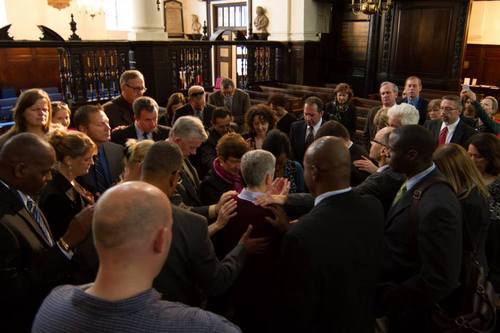
He is an astounding man of God. I was quite inspired hearing his passion and commitment to hold worship services in the ways that accommodate the time limitations of those who work in the heart of the city. I admire His church leadership team’s creativity to reach out to the border community with love while being sensitive to their time constraints. I believe it takes new learning and skills to be able to create a space where everyone feels welcomed without exception, and comfortable enough to pray with and be prayed for.
Another church we visited was St. Paul’s Cathedral’s. Coming from a small town in my country where most churches worship in mud houses, under tents and open-air fields, I was overwhelmed by the size of St. Paul’s Cathedral’s colorful arts, amazing architectural design and the number of tourists visiting the church. I am grateful to our tour guide who took us inside the church and explained the incredible history that the church continues to share with others. I am honored to have experienced their evensong service that was very formal and traditional. But, one can hardly miss the absence of women in the worship service. Men performed everything; and the children/youth choir consists of all boys. I am uncertain but we may have attended a men’s ministry service.
For my Sunday service I went to a Baptist church just around the corner near Lancaster Hall Hotel. It is a small church, but filled with people from different racial backgrounds and a lively music service.
What stood out from my visit to that church is their warm welcoming spirit. I felt welcomed when the lady at the entry greeted me and told me at the outset that they have a celebration at the end of the service. She welcomed me to stay and join them for coffee at the end of the service at the fellowship hall. She did not tell me what the celebration was but that raised my curiosity and I decided to wait until the end.
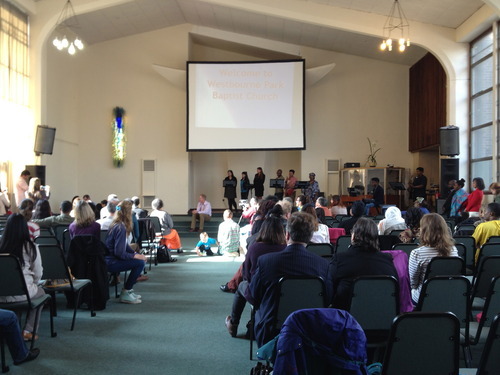
After the sermon, the pastor called a woman who was ready to be baptized. It was really neat to see the whole congregation applaud in joy families and friends taking pictures and giving her hugs and flowers as she was getting baptized. As someone who has experienced a somewhat similar baptism seeing the whole excitement made me appreciate the tradition we share as the body of Christ. I stayed until the end of the service and joined them in the fellowship hall for coffee. A couple of people talked to me and I had a chance to chat with them. Now as I reflect on that experience I simply remember the experience but made no personal lasting connection with anyone there. Is this what it means to be a global person? We meet people, chat, and move on to a new place.
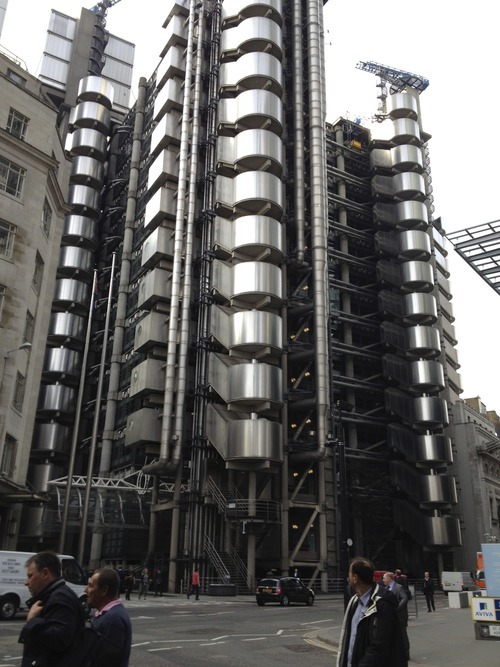
Lloyds of London, a very famous insurance market in the finical district of London is also well known around the globe. It has one of the most amazing architectures I have ever seen. It has an industrial look on the outside and a very interesting interior design with plenty of escalators. I appreciated getting to know a little bit about their history and all the odd things that they insure. A large number of people work inside the building—both female and male. At one point our guide tour pointed out that there are more women working in the Lloyd’s markets than before. It seems that only men traditionally held those jobs. Interesting to me that while some corporations are open to hiring women, the church puts boundaries up to restrict women’s involvement.
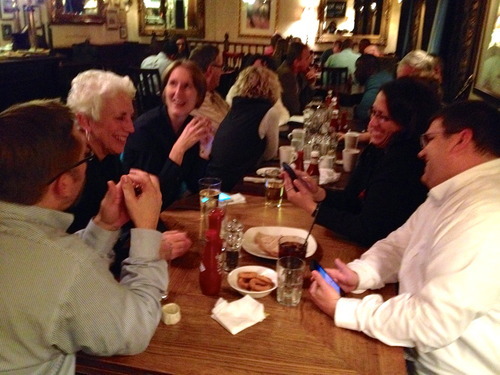
Our last dinner at The Swan was incredible filled with lots of laughter, sharing meals and memorable pictures. The food was fantastic and the staff was incredible. It was a great way to end our time in London.
New Knowledge, Practice, and application
There was so much information I learned from the conference, advisors presentations and LGP3 cohort presentation that I can utilize in my personal life and ministry roles. One of my newest learning comes from Dr. Faith’s presentation on globalization. From her presentation, I gained a bigger picture of how we are inter-connected through business expansion across the globe via expanding markets for goods and services and the major role technology plays to facilitate this globalization.[1] The impact of globalization is not limited between certain global countries; it is everywhere. For instance, countries like Ethiopia where the land is controlled by the government and given to investors, mostly from other countries, the local investors and small business are simply vanishing. As a result the small business owners are becoming poorer and the government is getting richer. Now the young women and men are forced to immigrate to global countries like Saudi Arabia in search of jobs. Realizing how globalization, immigration, and technology are changing our world raised my awareness of the role my ministry can play in a poor country like mine.
Another important learning from her presentation she explained was her explanation of the challenges of today’ s leaders who live in a different culture than their own. This resonated with me because of where I am situated now in my work and studies. I know that I have done well adjusting into a new culture but sometimes it is hard to know what works best and how to effectively communicate it in a new culture. I took into heart Faith’s advice that, “whether business, not-for-profit, religious or educational, today’s leaders must be versed in different competencies than previous generations.”[2]
As a result of my time in London there are two things I have begun integrating in my live and work. One is that I have been very intentional about developing a network of people that I can pray with, study scripture and share my ministry.
Despite my busy schedule I have tried to set time aside once in a week to slow down and be with a group of four women. So far it is going well and I am grateful for the opportunity to learn the Bible together and encourage one another.
Another area I have attempted to implement is spending time with missional leaders in churches. I discuss with them how we can connect and influence leaders and get them motivated toward building relationships across denominational lines and religious differences. My passion is to see communities of faith get out of building and be face to face in dialogue while sharing our stories.
Synthesis
Contemporary social theory, by Anthony Elliot is one of a required reading for this term which helped to think through “the key social institutions”[3] that has contributed to London becoming such a global city. I still remember how I was overwhelmed by the number people in long lines at the Heathrow airport eager to get through the security point to see the country. It really raised my curiosity to see what is attractive about London. After we visited a couple of noble places, I realized that as much as people are prone to new things there is also a great appreciation for old or I should said authenticity. In my observation, it might be the country’s intentional openness and the way the government chooses to treat visitors and immigrants that make a difference. The same is true in any ministry context, we can choose to open up ourselves to change anyway we want. The amazing old and new high-rise buildings speak loud the city’s philosophy to keep in balance both the past, present and future history of their country
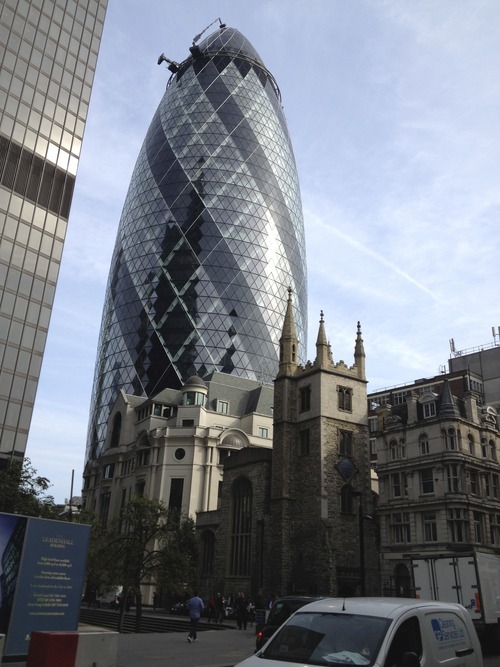
Speaking of old and new, I am reminded of some of the churches in the State where the church decides to get rid of the pews and replace them with new individual chairs so that younger families can feel welcomed. I believe it is great that they are doing something they believe would work to make others feel comfortable. But I also think changing something just for the sake of change does not always make people happy. As much as people care to find a church they like, they are also hungry for someone they can trust to pray with and prayed for.
The book, Doing Visual Ethnography by Sara Pink, is another interesting read that continues to develop a healthy way of using visuals in my research and ministry experience. Pink in this books challenges the general notion that sees the uses visuals as only data collecting. Rather Pink explains visual ethnography as “a process of creating and representing knowledge (about society, culture and individuals) that is based on ethnographers’ own experiences.”[4] While we believe in the ability of visuals to create meaning “it does not claim to produce an objective or truthful account of reality, but should aim to offer versions of ethnographers’ experiences of reality that are as loyal as possible to the context, negotiations and intersubjectivities through which the knowledge was produced.”[5] This mean there is also room for flexibility to examine and question the context of the knowledge it represents. It is also equally true that people can look at still picture and come up with different meanings. As we have different ways of looking at thing from different angle, often our outlooks are shaped by our bias of our own cultures. I am grateful to have read this book before I traveled to London, which really introduced me to some basic necessary disciplines to keep in mind. Especially, useful was Pink’s advise on asking permission before taking people’s picture. I remember when we were visiting Lloyds of London, I wanted to take pictures of people standing outside having some drinks then I quickly realized that I needed to have their permission before I take their pictures.
Critical Thinking by Richard Paul and Linda Elder revealed to me a very important piece that I need to develop for my own spiritual growth and the research projects I am doing in this program. Knowing my personality, as a less critical person I need to learn how to cultivate critical thinking, ask questions and never assume that I know the answer. There is much progress in my life; and my time in London exposed me to difference cultures and faith experiences allowing me to see life from different points of view. The result is that I am more open to new concepts and courageous to share with others what God has put in my heart.
Bibliography
Elder, Linda, and Richard Paul. The Miniature Guide to Critical Thinking Concepts and
Tools. Kindly ed. Tomales, CA: The Foundation for Critical Thinking, 2009
Elliott, Anthony. Contemporary Social Theory: An Introduction. London:
Routledge, 2009.
Faith, Wambura Ngunjiri. “Global Leadership: Emerging Issues and Researchable
Ideas.” Power point presentation at Global Leadership Perspective Conference. St James Clerkenwell Clerkenwell Close, London, September 28, 2013.
Pink Sarah, Doing Visual Ethnography. (SAGE Publications: Kindle Edition, 2006.) 456-461,
Kindle.
[1] Faith, Wambura Ngunjiri. “Global Leadership: Emerging Issues and Researchable Ideas” ( power point presentation at Global Leadership Perspective Conference, St James Clerkenwell Clerkenwell Close, London, September 28, 2013).
[2] Ngunjiri, “Global Leadership.”
[3] Anthony Elliott, Contemporary Social Theory: An Introduction (London: Routledge, 2009), 15.
[4] Sarah Pink, Doing Visual Ethnography. (SAGE Publications: Kindle Edition, 2006), Kindle Location, 459.
[5] Pink, Doing Visual Ethnography, 461.
One response to “London Experience”
Leave a Reply
You must be logged in to post a comment.
Hello friends, its great post about cultureand
completely explained, keep it up all the time.